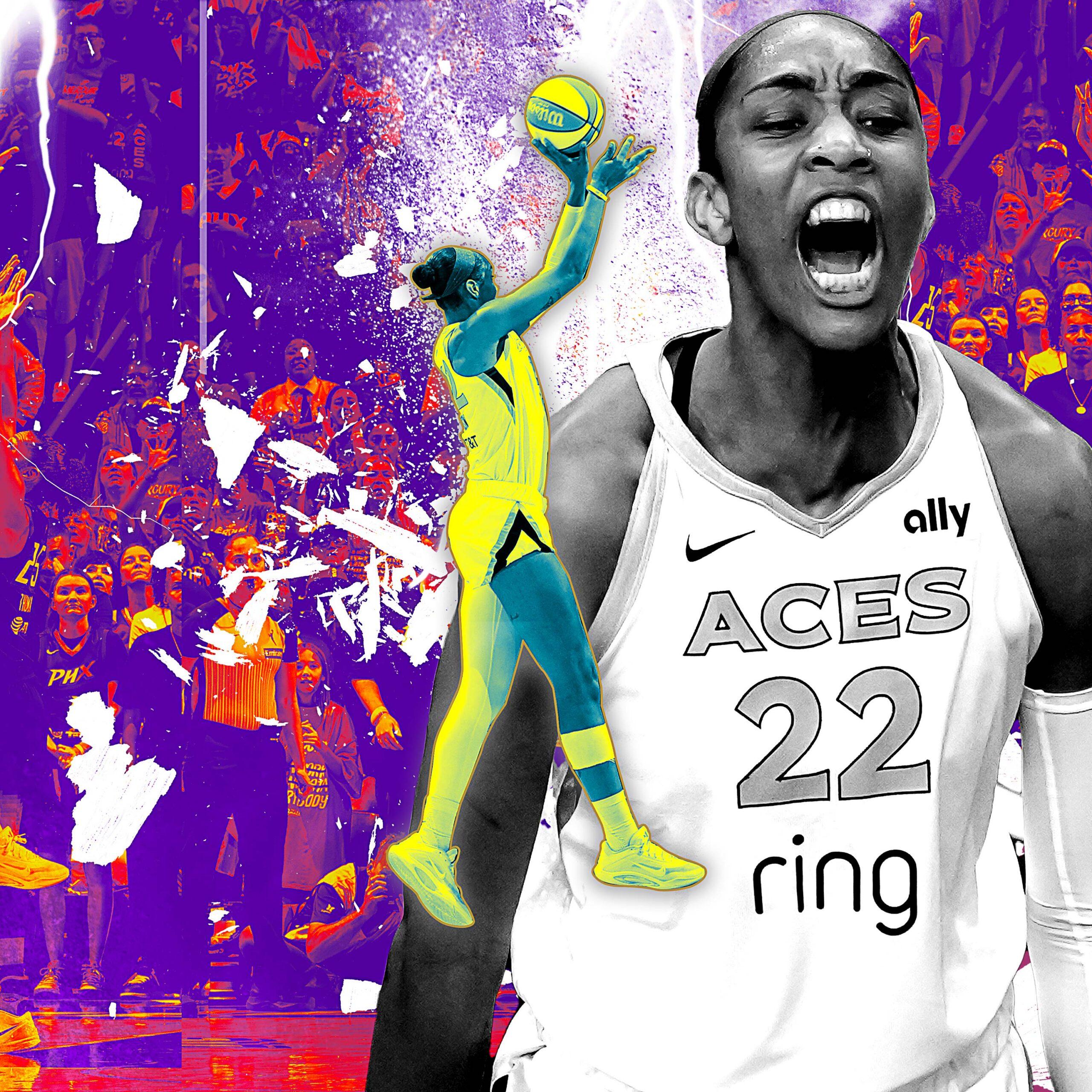
You could almost feel the energy shifting at Phoenix’s Mortgage Matchup Center. Satou Sabally’s cranium, with all the force of her desperate effort to save a possession, a game, a series, and a title hunt in the fourth quarter, collided with Kierstan Bell’s thigh. For four stressful minutes, Sabally tried and struggled to stand on her own, before being helped off the court. In that time, a chant from the home crowd—“Satou, Satou, Satou!”—erupted. Solemn and determined, Phoenix Mercury teammate Kahleah Copper nailed Sabally’s free throws. Shortly after, Copper drove to the rim for two acrobatic and-1s and nailed a 3. Then DeWanna Bonner nailed another 3 from Scottsdale. A 17-point Aces fourth-quarter lead evaporated to zero. The arena had turned into a cauldron.
With under a minute left in a tie game, the ball slipped through a cutting A’ja Wilson’s hands. Yes, the same Wilson who was just named the league’s MVP for a fourth time. Yes, the same Wilson who just a year ago completed a staggering 32 percent of her team’s possessions and turned the ball over just 1.3 times per game. Yes, the same hands that regularly stretch over multiple defenders to catch and finish Chelsea Gray’s quarterback passes.
It was the kind of plot twist that happens only in sports: a gut-curdling heartbreak of Sabally’s injury alchemizing into an inspired comeback for the Mercury, hand delivered by the basketball gods.
But then … if the basketball gods had really wanted to help the Mercury, they would have answered Bonner’s final prayer.
If you’re reading this, you probably already know that this isn’t a story about a comeback. You probably already know that the basketball gods weren’t helping the Mercury as much as they were testing one of their most loyal disciples, Wilson. You probably already know that as a classic playoff narrative—beating a team that’s down 0-2 in the WNBA Finals—became more and more of a desperate struggle, Wilson smelled blood, tasted the proximity of victory, and bit down harder.
All night, she gobbled up boards, swatted away shots, and operated through double-teams, staying stable through the storm and patiently prodding Phoenix, finishing with a game-high 34 points, 14 rebounds, and three blocks. But there was no bigger moment—in the game or the Las Vegas Aces’ entire season—than her final pressure-packed bucket, which gave the Aces a 3-0 series lead and virtually ended the Mercury’s title hopes.
Here’s how the final shot went, now the crown jewel in A’ja’s anthology of immortalizing moments: With five seconds left in the game, the Aces inbounded the ball inside half court. Wilson caught the rock at the top of the free throw line, drove left to evade the double, spun away from Bonner but toward Alyssa Thomas, and nailed an all-time 8-foot fadeaway, putting the Aces up two with just 0.3 seconds left:
We are quick, in these moments, to look for mortal answers to immortal problems. Call it a Promethean complex, humanity’s drive to obtain forbidden knowledge. I certainly have my quibbles with Phoenix’s defense on that last play. Bonner shouldn’t have shot the gap on the screen coverage, and the double should have forced Wilson to the right—her nondominant side, although she’s pretty dominant there, too.
But looking for the mistake in a magical moment misses the point. Consider this: For days, WNBA fans and analysts have debated whether or not the Mercury should double-team Wilson. And in her final play of the game, Wilson showed us how self-defeating every solution is.
It’s hard enough to scheme against the Aces, the best crunch-time team in the WNBA this regular season. On the final play, the Aces had four proven and dangerous scoring threats on the floor at once. The Mercury made the right gamble, doubling off the remaining player, Megan Gustafson. It’s hard to effectively double a player who’s facing up, though, and it’s nearly impossible when your opponent is as thoroughly aware of their height advantage as Wilson has been against Thomas all series. Bottom line: Wilson, playmaking improvements be damned, was never giving that ball up.
"I just needed the bucket to go in,” she told ESPN’s Holly Rowe after the game. “I didn't really see who was in front of me. I didn't care. This is the Finals."
This series has been a clash between superstar Big Threes, with three Finals MVPs combined between them. Thomas and Bonner alone, whom Wilson shot over, have collectively appeared in 23 Finals games. There were eight Olympians on the floor—but only one Zeus.
Wilson has four MVPs—an unprecedented feat in WNBA history—three Defensive Player of the Year awards, and the only 1,000-point season in league history. And she’s one win away from three rings, as many as Diana Taurasi and Candace Parker. And she’s only 29. She exists in a stratosphere of her own, but it’s not lonely on her mountaintop.
Other GOATs often seem as if they’re trapped on an island of their own ambitions. But Wilson is the connective tissue for the Aces, who find strength in their togetherness. How many superstars are tasked with buying birthday (and Pride) cakes? Midseason acquisition Nalyssa Smith credits Wilson with helping her rediscover her love for the game. Multiple teammates have referred to her as the best leader they have been around.
“I know when I had that turnover, the first people I see are my teammates, and they’re like, ‘We got you, we’re gonna get that back,’” Wilson said, talking about the balance of accountability and encouragement that has fostered roster-wide trust.
Off the court, Wilson’s personality is boundless. She wears her inspirations, insecurities, and love for her teammates on her sleeve. But the moment she steps onto the court, her emotions concentrate into a steely-eyed fortress of resolve.
Aces coach Becky Hammon, who’d never won a Game 3 until Wednesday night, knows how hard it is to pull it off when you’re up 2-0. The opponent is ravenous, right at the moment when your team is most likely to exhale. A Mazzulla-ism comes to mind: The closer you are to winning, the closer you are to losing. But in the Aces’ case, it was Hammon who made the biggest adjustment in Game 3, opening with a box-and-one that confounded Phoenix and powered an early Vegas run. It was the Aces who were defending and executing like they were the ones down 0-2, and now they’re one win away from their third title in four years.
This is how dynasties build and sustain themselves. They’re not battling the opponent in front of them as much as they’re battling their own human follies that can foil greatness. They find a way to stay focused when it would be most natural to let up. Winning the series, it was evident, was not enough. Total destruction is the standard.
Hammon and Wilson share that ineffable thing that sports nerds like to pretend doesn’t exist and the jocks lean on too much: a killer instinct.
You saw it in Hammon’s most important decision of the night. On the Aces’ final offensive possession of the game, the offense looked discomposed, and it seemed like the ball wasn’t going to get to Wilson. Hammon, the clock ticking down, had the wherewithal to call a timeout and set up a simple, effective play: “Give the ball to A’ja and get out of the way,” she said.
The rest is history.



